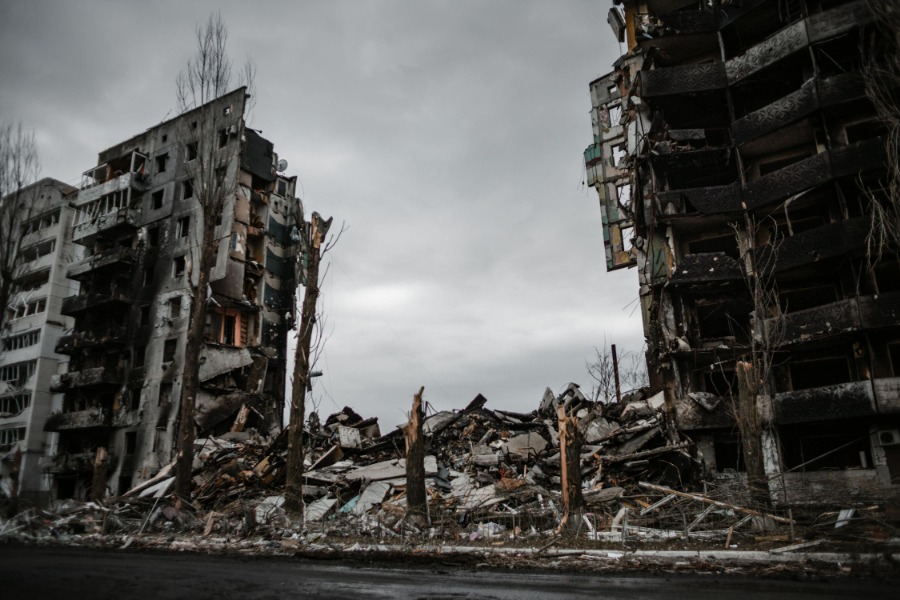Why Some Ukrainians Are Betting on Trump

Published by The Lawfare Institute
in Cooperation With

The result of the United States’s presidential election has plunged Ukraine into another cycle of dread: Now that Donald Trump is coming back to the White House, what will he do to Ukraine?
No one knows the answer, but everyone is guessing, falling into one of two camps—one of which may surprise those who see Trump as an unqualified disaster for Kyiv. Yes, there are pessimists among the Ukrainians, but there are also a surprising number of optimists.
The pessimists are terrified that Trump will do what he and his running mate have all but said: halt aid to Ukraine and force the country into an unfavorable settlement with Russia. This camp has legitimate reasons for panic. You’d be hard pressed to find an American politician with more negative publicly stated views on Ukraine than Trump or his running mate, JD Vance.
Trump campaigned using clear anti-Ukrainian, and pro-Russian, rhetoric: He mocked Ukrainian President Volodymyr Zelensky, criticized American aid to Ukraine, and described Putin’s invasion as “savvy” and “genius.” He pressured House Republicans against passing additional funding for Ukraine for months, a delay that arguably led to the fall of several Ukrainian towns as a result of ammunition shortages. As Russian troops were building up on Ukraine’s borders before the full-scale invasion, Vance claimed he didn’t care about what happened to Ukraine. He also falsely asserted that Ukraine has “maybe the most corrupt leadership anywhere in the world” and called to cut off military aid.
All that is before you get to the role that Ukraine, and Zelensky himself, played in the events that led to Trump’s first impeachment.
Not only does Trump dislike Ukraine, but he also has a thing for autocrats generally, and Putin in particular. His links with Russia are well documented—from extensive contacts between his staff and the Russians, to his siding with the Kremlin over the FBI on Russian election interference in 2016, to openly boasting about having “a very good relationship” with Putin.
Finally, he has promised to resolve the war before he even gets into office—within 24 hours—prompting some Ukrainian soldiers to joke about planning vacations the weekend after the presidential election.
“I will have the deal done in one day,” Trump said on Fox News.
The pessimists argue that this track record shows that Trump cares about power, money, and little else. And because of his track record and his promises, they anticipate that he might stop the flow of military aid to Ukraine and force the country into a bad deal with Russia, with no long-term security guarantees.
“There are plans, and there are circumstances that turn all deals upside down. For example … when Trump suddenly loses interest in this topic [of Ukraine] after the pompous declaration of a ‘truce’ … Russia strikes a new powerful blow,” Ukrainian security analyst Maria Zolkina wrote on Facebook.
So given all this, what exactly is the optimists’ case? They are not in denial about Trump’s rhetoric, and they do not exactly deny Trump’s Putin attraction or, more generally, his love of power. Rather, the optimists argue that Trump’s cynicism presents an opening, an opportunity to persuade Trump that supporting Ukraine is in his interests. They believe Ukraine can—and, frankly, has no choice but to—tap into the hawkish part of the Republican establishment and convince Trump to be more aggressive with Russia, because letting Putin prevail in Ukraine will hurt Trump’s legacy.
But the main reason for this optimism about the coming Trump presidency is not love for Trump but profound disappointment with outgoing President Biden. In the U.S., Biden is generally seen as having been strong on Ukraine—slow at times perhaps, overly cautious, sure, but a solid B+. Yet that is not the way Ukrainians perceive him. Ukrainians are not wowed by the train trip into Kyiv (we’ve all done similar trips) or the “as long as it takes” rhetoric. Most Ukrainians have a relatively limited sense of countervailing domestic political pressures in the United States and perceive Biden as having been extremely slow, mired in Cold War thinking about Russia, and unwilling to go all-in on Ukrainian victory.
The Trump optimists in Ukraine, in particular, perceive Biden’s response to Russia’s full-scale war as a failure. They think the Biden administration has been overly cautious vis-a-vis Russia. They view the word “escalation” as a kind of boogeyman code for denying Ukraine the tools to prevail, and they particularly hate Biden National Security Adviser Jake Sullivan for avoiding offending Russia at the cost of Ukrainian lives and territory. Washington’s slow, incremental flow of weapons has even led many Ukrainians to believe that the U.S. doesn’t want Ukraine to win and is just using Ukrainians to weaken its longtime adversary. The Trump optimists are tired of begging the current administration to be more decisive. And just like half of America, they want radical change—and, for better or for worse, that is one thing that Trump genuinely does represent.
The Ukrainian government, both publicly and privately, cautiously aligns with the optimists.
“It is certain that the war will end sooner with the policies of the team that will now lead the White House,” President Zelensky said in an interview with the Ukrainian media outlet Suspilne.
Particularly in light of the election results, Kyiv has no other option: It’s deeply dependent on America’s weapons, and it must find a way to work with whoever is in the White House. A government official close to Zelensky said recently that the Presidential Office wasn’t too worried about Trump and was calmly preparing to cooperate with his administration, according to sources present.
“Trump is unpredictable. This is a plus for our situation. We need to wait and play our cards right,” Ukrainian lawmaker Oleksii Honcharenko wrote on his Telegram channel.
Zelensky himself has been trying to win over Trump for months. Two points of his “victory plan”—access to Ukraine’s natural resources and Ukrainian troops replacing U.S. military contingents in Europe—were reportedly included as sweeteners for the president-elect.
Ukraine’s president was also one of the first leaders to call Trump after the election, congratulating him on “his historic landslide victory,” a phraseology that plays to Trump’s general desire to overstate the magnitudes of his wins.
“His tremendous campaign made this result possible,” Zelensky tweeted after the call. “I praised his family and team for their great work.”
The Ukrainian president has also repeatedly called for “peace through strength,” tapping into the Republican talking points that Biden is weak and that the world needs a stronger, more decisive American leader.
Trump’s controversial cabinet picks have been feeding the arguments from both camps.
On the one hand, there are Trump’s incoming national security adviser, Mike Waltz, and secretary of state, Marco Rubio, choices best summarized from a Ukrainian point of view as “could have been worse.” Both politicians have advocated for a more aggressive U.S. policy against China, Iran, and Russia.
In an interview with NPR just days before the election, Rep. Waltz (R-Fla.) said that to pressure the Kremlin, the U.S. could enforce stronger sanctions on the Russian energy sector and finally let Ukraine use western long-range weapons deep inside Russian territory. Kyiv has been desperately asking to lift these restrictions for many months, which Biden finally did on Nov. 17.
Sen. Rubio (R-Fla.), meanwhile, was one of the 15 Republican lawmakers who voted against the supplemental funding for Ukraine in spring of 2024. But he has also said that he wants Ukraine to have more leverage than Russia. And his general foreign policy posture has been hawkish.
“I would be comfortable with a deal that ends these hostilities, and that I think is favorable to Ukraine, meaning that they have their own sovereignty, that they don’t become a satellite state or a puppet state that is constantly held hostage by the Russians,” he told NBC this September. “We hope that when that time comes, there is more leverage on the Ukrainian side than on the Russian side.”
On the other hand, there is Trump’s Pentagon nominee, Pete Hegseth, and director of national intelligence nominee, Tulsi Gabbard. The first is a veteran and Fox News host who’s been described as “the least qualified nominee for Secretary of Defence in American history.” The second has been amplifying the Kremlin’s talking points about NATO provoking Russia’s war and has opposed sanctions against Moscow.
But there’s another player in Trump’s ambition to end the war, whether in 24 hours or over a more protracted period of time: Vladimir Putin. And the Russian president will not be serving in Trump’s cabinet. With Russia making steady gains on the battlefield and solidifying support from its authoritarian allies, the Kremlin has no particular reason to put on the brakes now just because Trump declares peace in our time.
There are still ways for the U.S. to tighten Russia’s isolation, but they require greater risk tolerance from the American president. Ending the war is really about forcing Russia—not Ukraine—to consent to cessation of hostilities.
Even optimists know that Putin is unlikely to have a change of heart without a significant change of circumstances.





